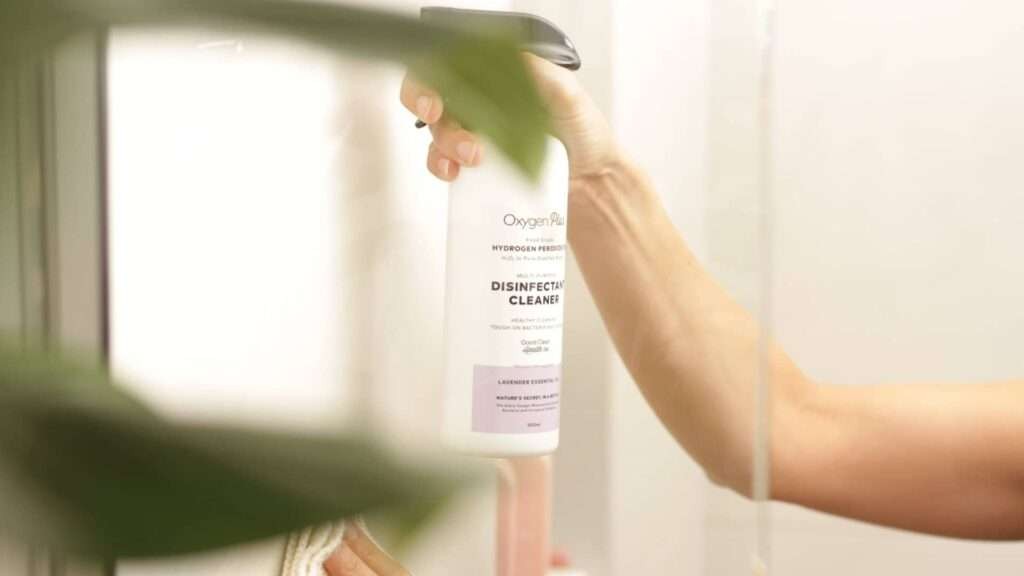Is Hydrogen Peroxide Eco-Friendly?
You’ve probably heard of hydrogen peroxide, but do you actually know what it is and what it can be used for? Hydrogen peroxide is a multi-purpose cleaner that has over fifty unique applications around the home and garden, from removing stains to helping your plants grow to cleaning your dog’s teeth! You’re probably thinking, “That sounds great, but is hydrogen peroxide safe and eco-friendly?” That’s a very important question and we’ll be thoroughly answering it today. Here’s what you need to know.

What exactly is hydrogen peroxide?
Hydrogen peroxide (H202) is a chemical that is simply water (H20) with an extra atom of oxygen. It’s a naturally-occurring compound that can be found in rainwater. In the atmosphere, hydrogen peroxide is formed after oxygen combines with sunlight to become ozone. The human immune system also produces hydrogen peroxide to control bacteria and viruses.
Hydrogen peroxide can effectively kill bacteria, viruses, yeast, fungi, and mould spores. In fact, it has been widely used in food manufacturing, personal care products, and the medical community for over 170 years.
Not all chemicals are dangerous
When you first see or hear the words “hydrogen peroxide,” you might think that it’s some dangerous substance. After all, green-minded consumers tend to use the rule of thumb that any ingredient with a long, complicated name should be avoided. While that rule generally serves people well, it can be misleading, as not all chemicals are dangerous.
Sometimes, a complex name is simply the formal scientific term for a naturally-occurring compound. For example, water (H20) is also a chemical. Scientifically, water is referred to as either oxidane or dihydrogen monoxide. If you saw those names on an ingredient label, you might avoid the product thinking it’s dangerous, however, they’re just fancy names for water. The same applies to hydrogen peroxide, which has almost the same chemical makeup as water.
As you can see, we don’t need our cleaning products to be chemical-free—we just need them to be free of harmful chemicals. This is why it’s important to do your research and learn which chemicals are dangerous and which are safe. If you’re not sure about an ingredient, look it up! The beauty of hydrogen peroxide is that what you see is what you get. It’s literally just water and oxygen. It’s completely non-toxic yet is an extremely effective cleaning and disinfecting agent. Unlike many cleaning products, you can rest assured there are no dangerous chemicals hidden in its ingredient label.
Is hydrogen peroxide eco-friendly?
Alright, now that you have a better understanding of what hydrogen peroxide is and its safety, let’s answer the question you’ve been wondering about. We’re happy to tell you that not only is hydrogen peroxide effective and non-toxic, but it’s also eco-friendly! Hydrogen peroxide biodegrades completely into just two natural substances: water and oxygen. This means that it’s completely safe for the environment. Not only does it biodegrade into natural substances, but it does so very quickly after application.
Why is it important to use eco-friendly cleaning products?
Many people use bleach or brand-name cleaners to clean and disinfect their homes and workspaces. While these cleaners will get the job done, they come with a slew of effects that can negatively impact the environment and our health.
There are many environmental and health risks associated with using non-green cleaning products, such as chlorine bleach, ammonia, and petroleum. When you use toxic products, harmful chemicals are released into the air and waterways. This can increase ozone depletion, pollution of our oceans, and smog. Not to mention, you and your family members can inhale the toxic fumes, which can lead to respiratory issues, skin and eye irritation, headaches, and may even contribute to more serious illnesses, such as cancer. By choosing eco-friendly cleaning products, such as hydrogen peroxide, you’re helping to protect our planet, your health, and the well-being of those around you.
What kind of hydrogen peroxide should you use?
For use around your home and garden, you should use a solution with a 3% concentration of hydrogen peroxide, such as Oxygen Plus. Higher solutions of hydrogen peroxide are available, but you want to avoid those as the powerful oxidation effects can be dangerous if the solution comes into contact with your skin. Hydrogen peroxide 3% is the concentration that’s used in hospitals for disinfecting so you surely won’t need a higher concentration than that.
The takeaway
Unlike traditional cleaning products such as bleach and ammonia, hydrogen peroxide 3% is safe, non-toxic, and eco-friendly. It works just as well as bleach, but without all the harmful side effects. With so many applications, you can trade in all of your toxic cleaning products for just one bottle of hydrogen peroxide 3%. Not only will your house be sparkling clean and germ-free, but you’ll also be supporting the health of your family, plants, animals, and our planet.
